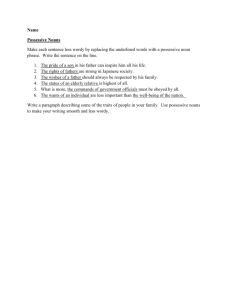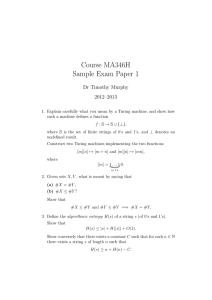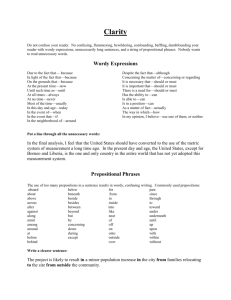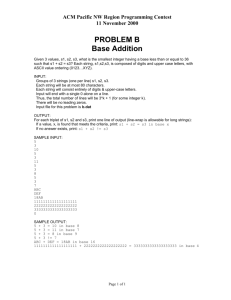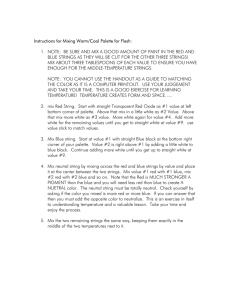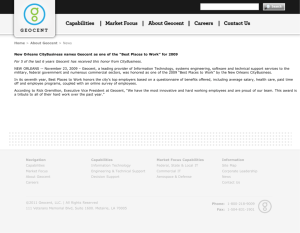The Portable Editor Volume 4, No. 2
advertisement
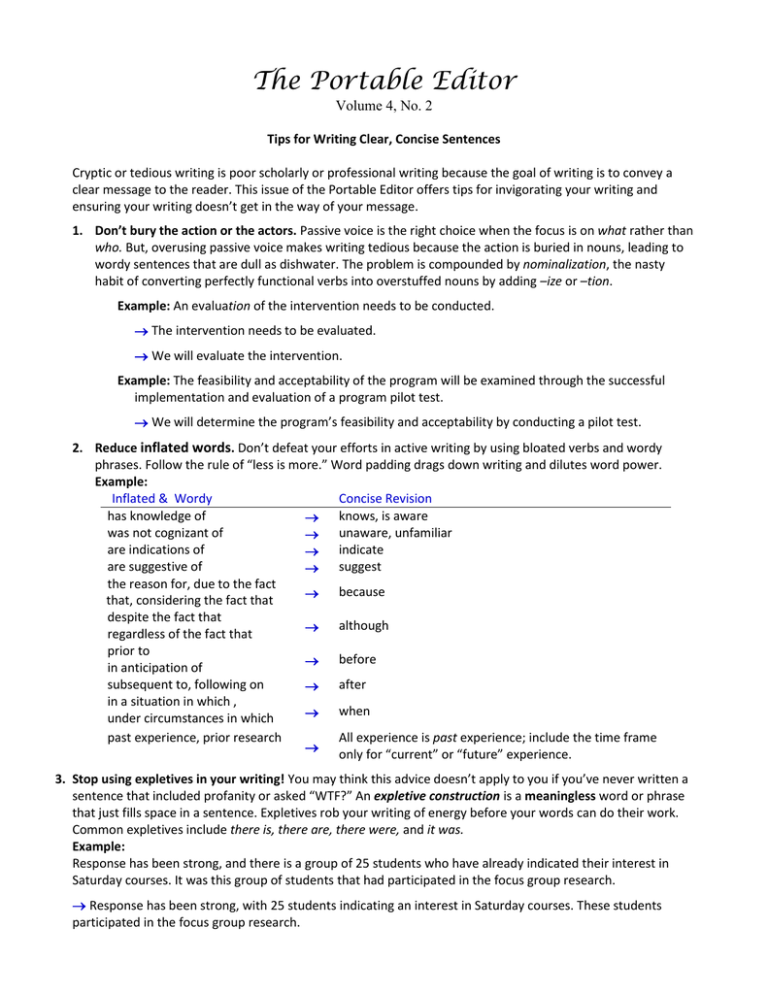
The Portable Editor Volume 4, No. 2 Tips for Writing Clear, Concise Sentences Cryptic or tedious writing is poor scholarly or professional writing because the goal of writing is to convey a clear message to the reader. This issue of the Portable Editor offers tips for invigorating your writing and ensuring your writing doesn’t get in the way of your message. 1. Don’t bury the action or the actors. Passive voice is the right choice when the focus is on what rather than who. But, overusing passive voice makes writing tedious because the action is buried in nouns, leading to wordy sentences that are dull as dishwater. The problem is compounded by nominalization, the nasty habit of converting perfectly functional verbs into overstuffed nouns by adding –ize or –tion. Example: An evaluation of the intervention needs to be conducted. The intervention needs to be evaluated. We will evaluate the intervention. Example: The feasibility and acceptability of the program will be examined through the successful implementation and evaluation of a program pilot test. We will determine the program’s feasibility and acceptability by conducting a pilot test. 2. Reduce inflated words. Don’t defeat your efforts in active writing by using bloated verbs and wordy phrases. Follow the rule of “less is more.” Word padding drags down writing and dilutes word power. Example: Inflated & Wordy Concise Revision has knowledge of knows, is aware was not cognizant of unaware, unfamiliar are indications of indicate are suggestive of suggest the reason for, due to the fact because that, considering the fact that despite the fact that although regardless of the fact that prior to before in anticipation of subsequent to, following on after in a situation in which , when under circumstances in which past experience, prior research All experience is past experience; include the time frame only for “current” or “future” experience. 3. Stop using expletives in your writing! You may think this advice doesn’t apply to you if you’ve never written a sentence that included profanity or asked “WTF?” An expletive construction is a meaningless word or phrase that just fills space in a sentence. Expletives rob your writing of energy before your words can do their work. Common expletives include there is, there are, there were, and it was. Example: Response has been strong, and there is a group of 25 students who have already indicated their interest in Saturday courses. It was this group of students that had participated in the focus group research. Response has been strong, with 25 students indicating an interest in Saturday courses. These students participated in the focus group research. 4. Don’t string readers along! Nothing is harder for a reader to comprehend than a long string of adjectives and nouns stacked up to modify one word. Often mocked as governmentspeak, social work writers are equally guilty of creating word strings that require clarification to be understood accurately. For example, “New program effect durability tests are being conducted by researchers.” could mean: Researchers are conducting tests of new measures that assess the durability of program effects. or Researchers are conducting new tests of the program effects that make treatments durable. or Researchers are performing new tests on the measures used to assess the durability of program effects. Revising word strings might add a few words to sentences, but your writing will be more clearly understood by readers. To untangle word strings, try the flipping technique. That is, find the end of the string and then read backwards, breaking the string into smaller modifying chunks by adding prepositional phrases (e.g., of, to, about, on) or entire clauses. Example: After fully assessing community needs, the next steps suggested by drug, alcohol, and tobacco use and abuse community outreach workers include developing a community-based … After assessing community needs, the next steps recommended by community outreach workers with experience in substance use and abuse programs include developing a community-based … Example: Findings from intimate partner violence prevention intervention research have shown few college campuses have adopted policies requiring faculty training in recognizing signs of victimization. Intervention research on the prevention of intimate partner violence has shown few college campuses have adopted policies requiring faculty training in recognizing signs of victimization. Another technique creates digestible word bundles by hyphenating words to better indicate their function as modifiers. See the difference between “a man eating shark” (yum!) and “a man-eating shark” (yikes!)? APA is generally conservative about hyphen use, so the “rule” is to hyphenate modifying words that appear before the word they modify: “an evidence-driven community-based approach” versus “an approach that is evidence driven and community based.” 5. Eliminate unnecessary prepositional phrases. Hold it! Doesn’t this tip contradict the one above? No, not all prepositions involve word strings; the key word is unnecessary. Example: The opinion of the working group the working group’s opinion Example: In the early part of the month of April, we traveled in our own car to the city of New Orleans in the state of Louisiana. In early April, we traveled by car to New Orleans, Louisiana. We drove to New Orleans in early April. Example: The effect of such a range of reference by the author was to assure the committee of his vast expertise and knowledge. The effect of the author’s range of reference was to assure the committee of his vast expertise and knowledge. The author’s range of reference assured the committee of his expertise. Need Writing Assistance? Susan and Diane are here to help! Contact the Writing Support Team via e-mail: soswwritingsupport@gmail.com Drop-In Writing Help: Tuesdays, Noon-2 p.m. 548e (Diane Wyant’s office)
